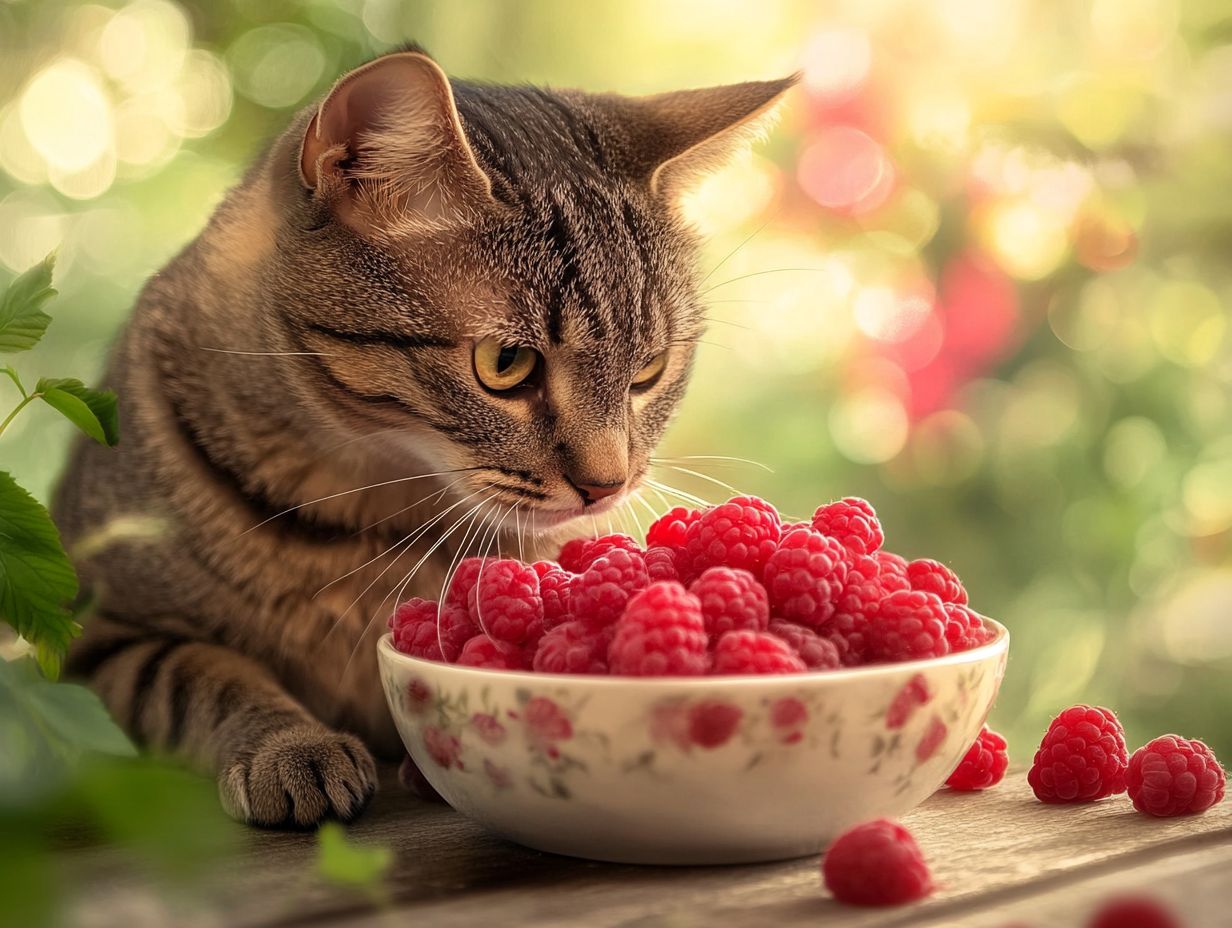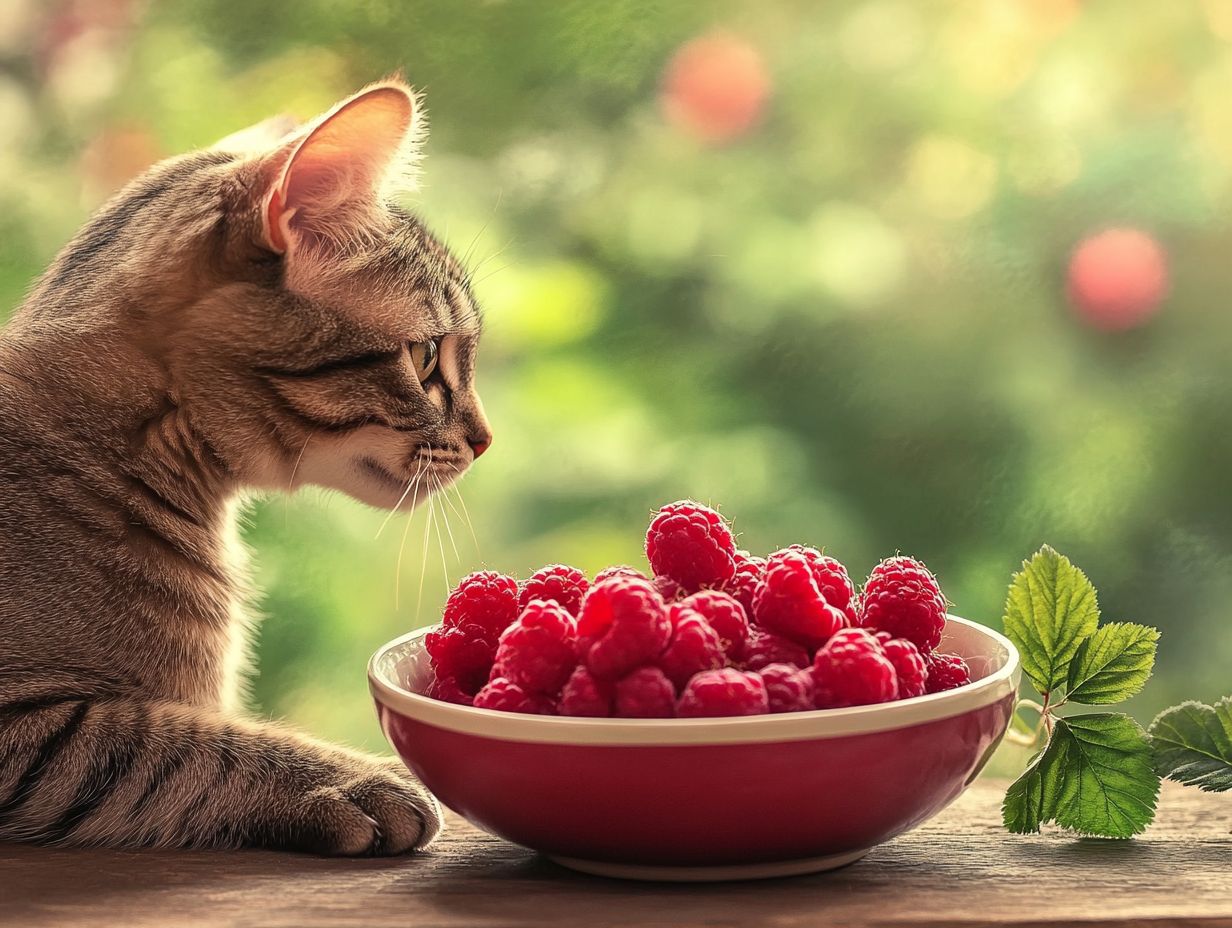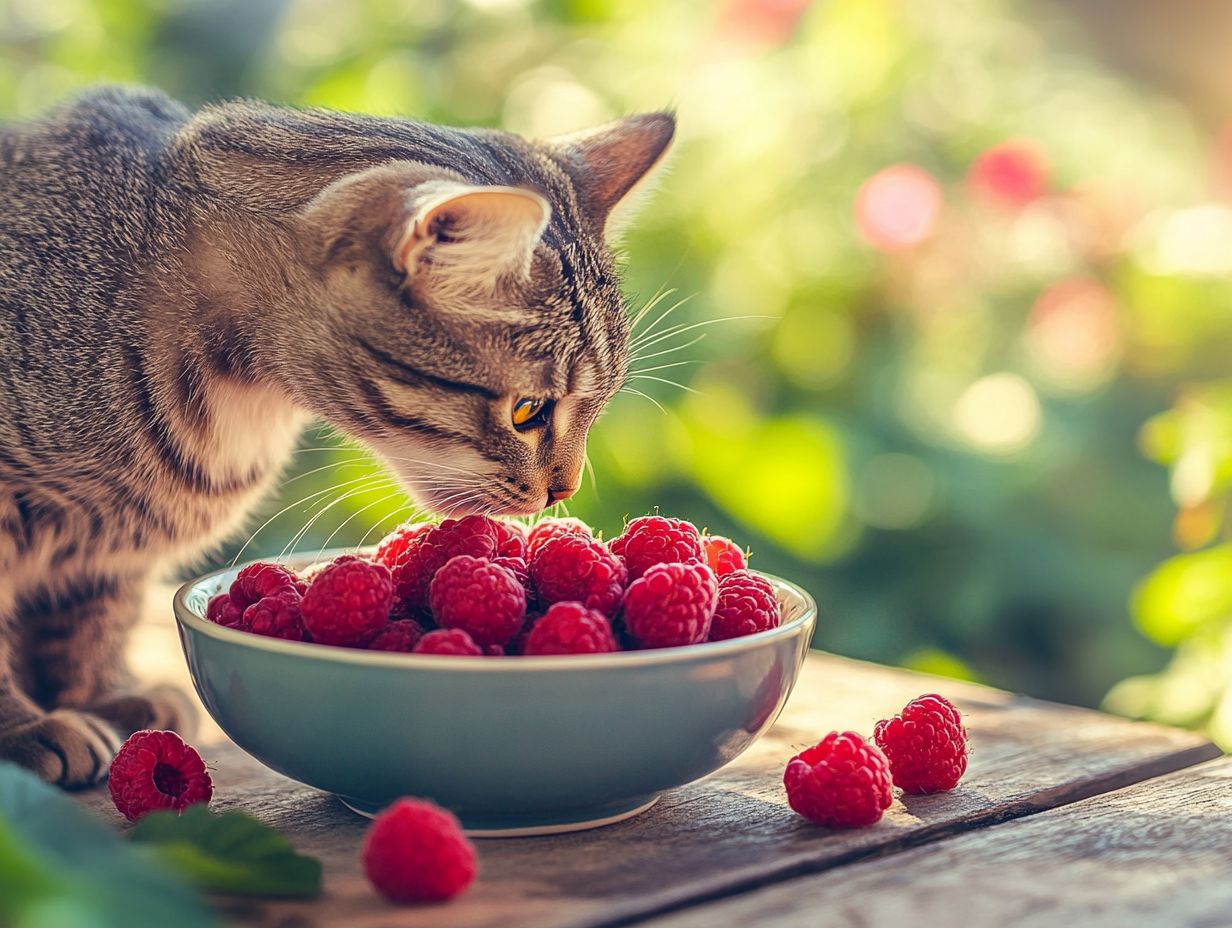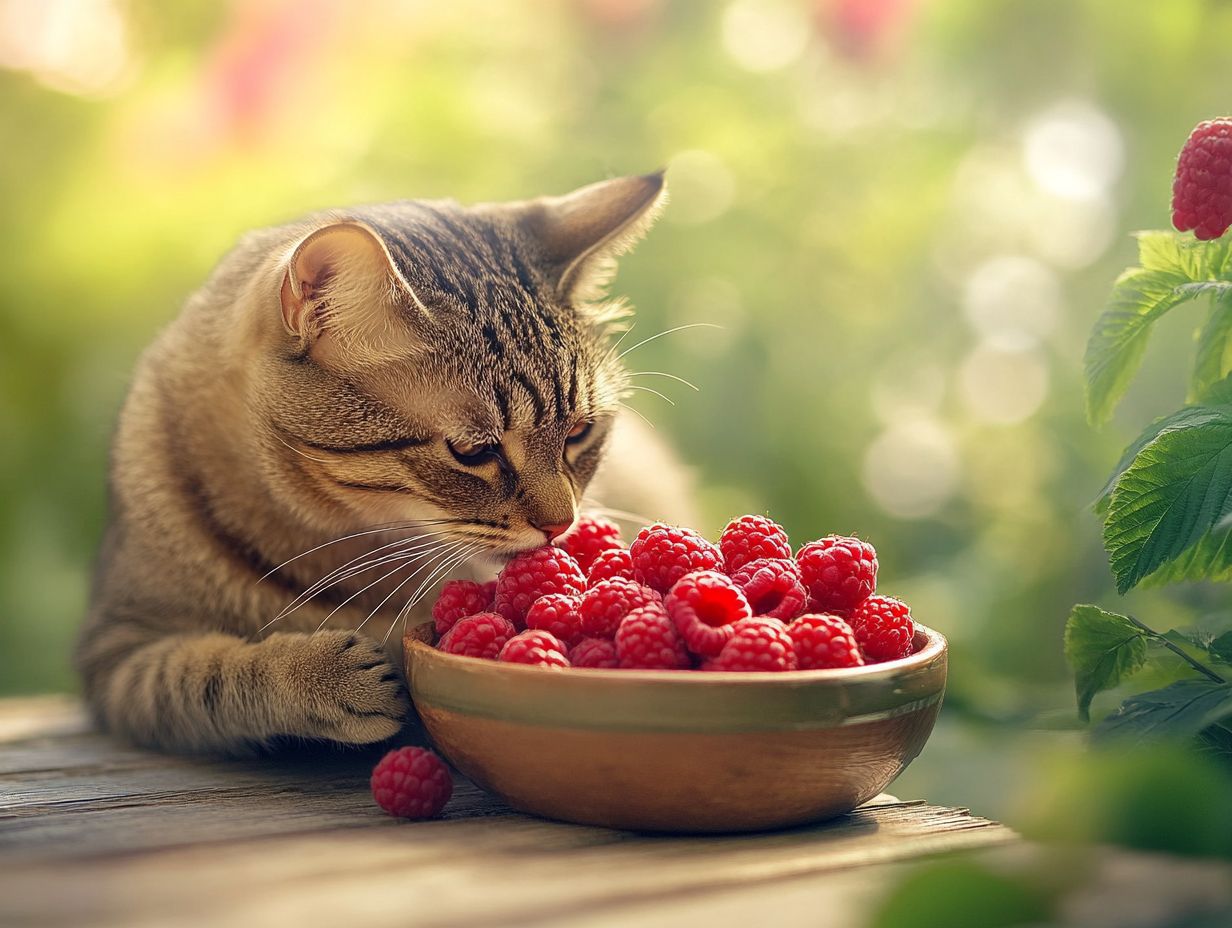This article addresses whether cats can safely eat raspberries, detailing the health benefits and risks associated with their consumption.
Curious about whether your feline friend can enjoy the vibrant taste of raspberries? This article explores a cat’s diet, focusing on the potential health benefits and risks of feeding them fruits like raspberries, and how their vitamins and dietary fiber can improve feline health.
Raspberries can provide antioxidants and vitamins that may support a cat’s immune system. From the antioxidants found in raspberries to possible allergic reactions, we provide essential insights to help you make informed dietary choices for your cat’s health and well-being.
Additionally, we suggest some alternative fruits such as watermelon, bananas, and strawberries that are safe for your furry companion.
Join us as we uncover the truth about cats, raspberries, and other fruits!
Key Takeaways:

- Limit raspberry intake to a few small pieces to avoid digestive upset. A safe serving size for most cats is 1-2 small raspberries, offered no more than once a week.
- Raspberries contain antioxidants and essential nutrients such as vitamin C and vitamin K that can benefit a cat’s health, but they should not be relied upon as a primary source of nutrition.
- Feeding cats raspberries may pose a risk of allergic reactions and digestive issues like vomiting or diarrhea, so monitor their intake and consult a veterinarian if any concerns arise.
Can Cats Eat Raspberries?
Raspberries are a brightly colored fruit known for their delicious taste, making them popular among humans. But can cats eat raspberries? Understanding a cat’s dietary needs is essential, and the inclusion of fruits like raspberries can offer health benefits when given in moderation.
Understanding a Cat’s Diet and Safe Foods
A cat’s diet is crucial because they are obligate carnivores, requiring specific nutrients to maintain their health, with protein and calcium being the most important. While standard cat food typically provides the necessary dietary components, many cat owners wonder if they can supplement their pets’ diets with fruits and vegetables.
It’s essential to recognize that not all human foods are suitable for a cat’s diet, and even beneficial foods should be offered in moderation. A balanced cat diet includes high-quality protein sources, vital for muscle maintenance and overall vitality. Calcium is another key element, essential for strong bones and teeth.
Additionally, vitamins and essential fatty acids play critical roles in maintaining energy levels and skin health. The curiosity of cat owners often leads to discussions about fruits, with raspberries frequently mentioned. While these can be given occasionally, they should be offered in small amounts, as excessive quantities can upset a cat’s digestive system.
Potential Health Benefits for Cats from Fruits
Cats, like all living beings, can benefit from a well-balanced diet that includes a variety of nutritious components. Certain fruits, such as raspberries, can offer significant health benefits.
These fruits are rich in essential vitamins and antioxidants, as well as dietary fiber, which aids in digestion and promotes overall feline wellness. Incorporating fruits in moderation can enhance a cat’s diet by introducing additional nutrients that support their health and vitality.
Antioxidant Properties, Nutritional Value, and More

Raspberries are rich in antioxidants and essential vitamins, providing significant nutritional value for cats. The antioxidants in raspberries help protect cells from damage and support the immune system, thereby reducing the risk of various diseases.
Vitamin C aids in collagen formation and enhances a cat’s immune response, while vitamin K is essential for proper blood clotting and bone health, ensuring a cat’s mobility. Additionally, vitamin E acts as an antioxidant that protects cell membranes and boosts the immune response.
In conclusion, while raspberries can be a fun treat for your cat, always prioritize their primary nutritional needs and consult your vet for personalized advice.
Yes, cats can eat raspberries in moderation. These berries provide essential vitamins such as vitamin A and B vitamins, which support metabolism, vision, reproduction, and the healthy growth of bones and tissues. However, pet owners should be aware of potential risks, including allergic reactions and digestive issues, that may arise when introducing new foods into their cats’ diets.
Potential Risks of Feeding Raspberries to Cats: Allergies and More
- Benefits: Provides essential vitamins, supports metabolism, and enhances overall feline health.
- Risks: Possible allergic reactions and digestive issues.
The health benefits of raspberries for cats come with potential risks that pet owners should consider. While raspberries are generally safe to offer, some cats may experience allergic reactions or digestive issues.
Possible Allergic Reactions and Digestive Issues
Like humans, cats can experience allergic reactions. Certain fruits, including raspberries, may not agree with all cats, potentially leading to upset stomachs or other gastrointestinal problems. Common signs of food allergies in cats include:
- Vomiting
- Diarrhea
- Itching
- Redness on skin
Pet owners should monitor their cats for any unusual behavior after eating raspberries. Ask yourself, “Has your cat shown any sensitivity to fruits before?” If any adverse reactions occur, consult a veterinarian for appropriate care. Understanding these reactions will help owners make better dietary choices for their pets.
How to Safely Feed Raspberries to Cats
Feeding guidelines for offering raspberries to cats include important safety precautions to ensure your pet remains healthy. When introducing any new food, do so gradually.
- Start with a small portion—limit to 1-2 raspberries per week.
- Carefully monitor your cat’s reaction.
- Be attentive to any signs of gastrointestinal distress.
Precautions and Recommendations

The following precautions and recommendations can help keep your cat safe when feeding raspberries:
- Always consult your veterinarian before introducing new foods.
- Offer any fruit in moderation to reduce the risk of digestive distress.
- As you gradually incorporate raspberries into their diet, monitor your cat’s weight and overall health.
Remember, every cat is unique, so work closely with your veterinarian to ensure they remain safe and happy while enjoying these fruity treats.
Alternative Fruits for Cats to Enjoy Safely
In addition to raspberries, there are several other fruits that are safe for cats, including watermelon, bananas, and blueberries. These fruits may offer healthier options and unique benefits.
Other Fruits that are Safe for Cats to Eat
Besides raspberries, safe fruits for cats include watermelon, bananas, and blueberries. Watermelon is highly hydrating, bananas provide potassium, and blueberries are rich in antioxidants, making them excellent options for occasional treats. However, always serve fruits in moderation to prevent digestive issues, as feline stomachs can be sensitive.
To make fruits more palatable, cut options like watermelon into small, manageable pieces and ensure any seeds are removed to avoid choking hazards. Bananas should be sliced thinly, while blueberries can be offered whole, as they are typically the right size for cats.
If you’re wondering whether it’s safe to share raspberries with your feline friend, this guide will clarify the benefits, risks, and best practices for feeding this fruit to cats.
Always monitor your cat for any allergic reactions when introducing new foods, as some may have individual sensitivities that require caution.
Frequently Asked Questions
Can Cats Eat Raspberries?

Yes, cats can eat raspberries in moderation, which means a few small berries once a week. They are not toxic to cats, but they should not make up a large portion of their diet.
What are the Health Benefits of Cats Eating Raspberries?
- Rich in antioxidants
- Contains vitamins like Vitamin C and K
- Provides anti-inflammatory properties
- Aids in digestion
Are There Any Risks to Cats Eating Raspberries?
- Can cause digestive issues like upset stomach or diarrhea if eaten in large quantities
- Possible allergic reactions, such as itching or swelling
While raspberries are generally safe, it’s crucial to monitor your cat’s reaction when introducing them to their diet.
Can Raspberries Be Given to Cats with Medical Conditions?
Cats with diabetes should avoid eating raspberries due to their high sugar content. It is always best to consult with a veterinarian before introducing new foods, especially for cats with medical conditions.
How Should Raspberries and Other Fruits Be Given to Cats?
Raspberries should be given as an occasional treat and in small amounts. These fruits should be washed thoroughly and either mashed or cut into small pieces before serving. For a general guideline, a cat weighing up to 10 pounds can be given about 1-2 small raspberries per week. Raspberries contain dietary fiber, vitamins, and antioxidants, which can offer health benefits, but moderation is key to avoid digestive upset due to their sugar content.
What Can I Do If My Cat Eats Too Many Raspberries or Other Fruits?
If a cat eats too many raspberries or other fruits, monitor their behavior and watch for any signs of digestive issues such as diarrhea or vomiting. If these symptoms persist for more than a few hours or if your cat shows any concerning signs, it is best to contact a veterinarian for advice on maintaining their well-being and dietary health.
Conclusion
To summarize, while raspberries can be a healthy treat for your cat, it’s important to observe their reactions to new foods. For any concerns, consult your veterinarian to ensure the best dietary choices for your furry friend. Share your experiences and questions in the comments below!